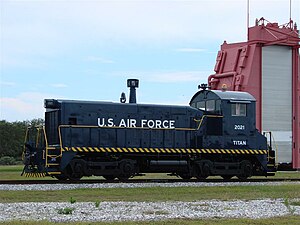EMD SW8

|
|||||||||||||
|
|||||||||||||
|
|||||||||||||
|
|||||||||||||
|
|||||||||||||
| Type and origin | |
|---|---|
| Power type | Diesel-electric |
| Builder |
General Motors Electro-Motive Division General Motors Diesel (GMD, Canada) |
| Model | SW8 |
| Build date | September 1950 – February 1954 |
| Total produced | 374 |
| Specifications | |
|---|---|
| Gauge | 4 ft 8 1⁄2 in (1,435 mm) standard gauge |
| Prime mover | EMD 567B |
| Engine type | Two-stroke diesel |
| Aspiration | Roots-type supercharger |
| Cylinders | 8 |
| Performance figures | |
|---|---|
| Power output | 800 hp (600 kW) |
| Career | |
|---|---|
| Locale |
North America South Korea |
An EMD SW8 is a diesel shunting/switching locomotive manufactured by General Motors Electro-Motive Division and General Motors Diesel between September 1950 and February 1954. Power is supplied by an EMD 567B 8-cylinder engine, for a total of 800 hp (600 kW). A total of 309 of this model were built for United States railroads and 65 for Canadian railroads. Starting in October 1953 a number of SW8s were built with either the 567BC or 567C engine, they are noted in the roster below.
The US Army ordered 41 SW8s, numbered 2000–2040, for service in Korea during the Korean War. These were shipped in the spring of 1951.
After the Korean War, many US Army-owned SW8s were turned over to the South Korean government while others were retained by the Army and assigned to various Army posts, depots and ammunition plants. Most were retired around 1990 and replaced in service by rebuilt geeps, such as GP10s from VMV in Paducah, KY, and other rebuilders.
Of all of the locomotives turned over to the Korean National Railroad, only one, KNR #2001, believed to be ex-USAX #2011, still exists. As of May 2011 it was stored in the back of a locomotive shed in the Korea Railroad Busan Rolling Stock Workshop, 125 Sincheon-ro, Busanjin-gu, Busan, Korea 614-765. Diesel Locomotive Team Leader Kim Hyun-Sik stated KORAIL is in talks with the city of Pusan to put the locomotive on display in the city as a part of Korea's heritage, as it is the oldest diesel locomotive in the country.
Two examples of these locomotives, ex-USAX #2019 and #2022, are preserved at the Heart of Dixie Railroad Museum in Alabama. After serving in Korea, #2019 was sent back to the manufacturer for reconditioning in 1953. #2022 was rebuilt in 1955. Both served in military bases in the United States until the early 1990s, finishing their careers at Fort Campbell, Ky. The Heart of Dixie Railroad Museum acquired them in 1995.
...
Wikipedia
